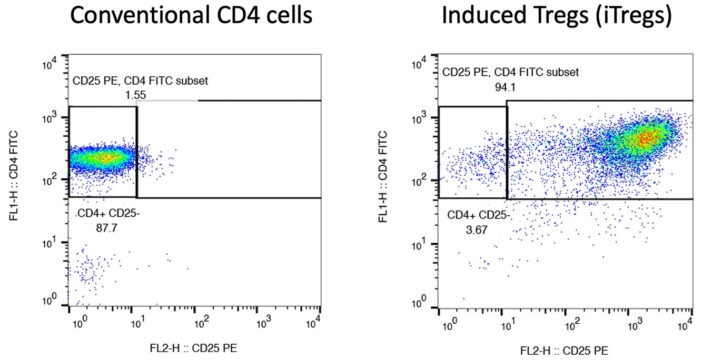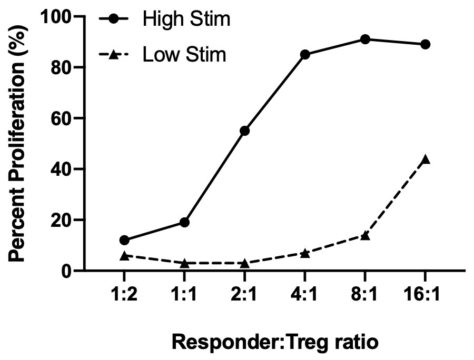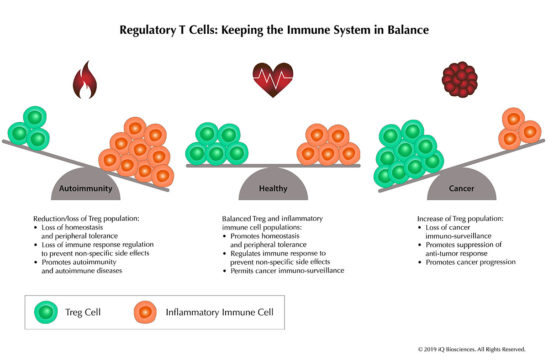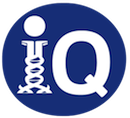- Help predict the potential effects of your Treg-targeted molecule with iQ’s T regulatory cell suppression assay
- Personalized experimental design ensures that the most relevant data for your molecule are generated
- All assays are performed with high-quality reagents and strict controls by experienced immunologists
- Data are provided in appropriate formats, including PowerPoint slides and/or direct data files
Service Overview
About iQ Biosciences’ Human Treg Suppression Assay Service
Regulatory T cells (Tregs) are currently being targeted as a modality to reshape the disease environment to modulate T cell function. In cases of autoimmunity, therapeutics are being developed to enhance Treg function, while in cancer, molecules are developed to abrogate Treg function. To develop these molecules, Treg suppression assays are commonly used to assess whether a potential therapeutic can inhibit or promote Treg function. In these assays, Tregs are co-cultured with responder cells, such as T cells or PBMCs, and functional readouts of the responder cells are performed at the end of the culture period. Proliferation and cytokine production are often used to assess function.
At iQ Biosciences, we have experience with these human Treg suppression assays and are now offering it as a bioservice to our customers. The Tregs in our assays are validated through immunophenotyping (Figure 1) and functional analysis (Figure 2). For immunophenotyping, cells are analyzed for the expression of CD4, CD25 (Figure 1), FOXP3 (data not shown), and CD127 (data not shown) while suppressive abilities are tested by co-culturing them with responder cells and assessing them for proliferation (Figure 2).

Figure 1. CD4 and CD25 expression after conversion from conventional CD4 cells. Conventional CD4 (left) cells were converted into Tregs (right) using a proprietary method. A small aliquot was taken after induction to evaluate expression of CD4 and CD25 by flow cytometric analysis (right).

Figure 2. Treg suppression in different culture and suppression conditions. CD8 T cells were labeled with CFSE and co-cultured with Tregs at different responder:Treg ratios and stimulated under high (solid line) or low (dotted line) conditions. After 4 days of culture, cells were harvested and analyzed for CFSE dilution by flow cytometry. Gating was first set on live cells, followed by CFSE positive cells. Percent of proliferation was determined by setting a marker for CFSE-diluted cells as compared to unstimulated control.
In our assays, the responder cells are labeled with CFSE to simplify downstream interrogation of proliferation. The CFSE-labeled responder cells are co-cultured with Tregs at different ratios in the presence of stimuli and the Treg-targeted molecule(s). After the culture period, the cells are harvested and analyzed with a flow cytometer to examine dilution of CFSE in responder cells, which reflects proliferative function (Figure 2). Molecules that promote Treg function will demonstrate less proliferation while those that inhibit Treg function will demonstrate more proliferation relative to untreated control.
Factors Important for Treg Suppression Activity
iQ has extensive experience with Treg function and can help you design the best experiment based on key factors that can influence suppressive abilities. Some factors that can influence suppression are:
-
- Type of Tregs – There are 2 types of Tregs, iTregs and nTregs, and each has their own unique properties. nTregs are believed to maintain peripheral tolerance to prevent autoimmunity and immune system hyper-responsiveness while iTregs are thought to develop from conventional T cells in a suppressive tumor environment. Depending on your goals, the type of Treg used in the suppression assay may play an important role. For example, if the goal is to promote suppressive abilities in the context of autoimmunity, then nTregs may be the more relevant choice since they are important for peripheral tolerance. In contrast, if Tregs in the tumor environment are targeted to release their suppressive abilities, then iTregs may be the more relevant type.
- Responder:Treg ratio – The number of Tregs and responders will vary depending on the microenvironment. In addition, the ratios may vary depending on the cancer type. Therefore, it will be important to understand how a Treg-targeted therapeutic operates under conditions with the different responder:Treg ratios.
- Stimulation conditions – A titration of stimulation conditions with proper controls, such as a culture without Tregs, will help establish the point in which Treg modulation can be properly observed. Treg modulation experiments should be performed at or above that stimulation point as the responders need to be activated in order to evaluate Treg suppression. If a titration is not properly performed and a stimulation condition is arbitrarily chosen below that point, the Treg modulator will have no effect as the Tregs do not have activated responders to regulate, and this would read out as false negative for the modulating molecule. Therefore, it is important to perform a titration to properly evaluate if the Treg modulator is affecting Tregs to regulate responders.
At iQ, we have refined our Treg suppression assay protocol with quality-controlled human Tregs, responder cells, and stimulation reagents. In addition, with our extensive knowledge of factors that influence Treg suppression and the different readouts for T cell function, iQ can help design the right experiments for you to determine the potential of your Treg-targeted therapeutic molecule.

